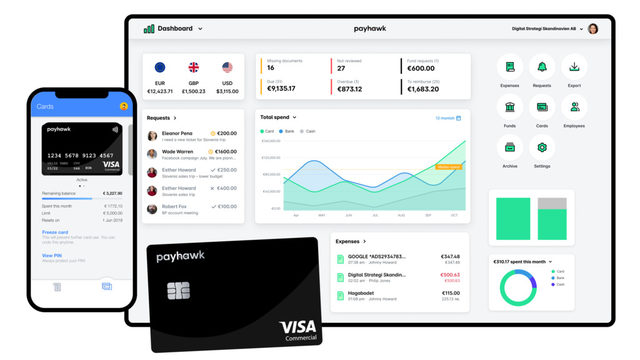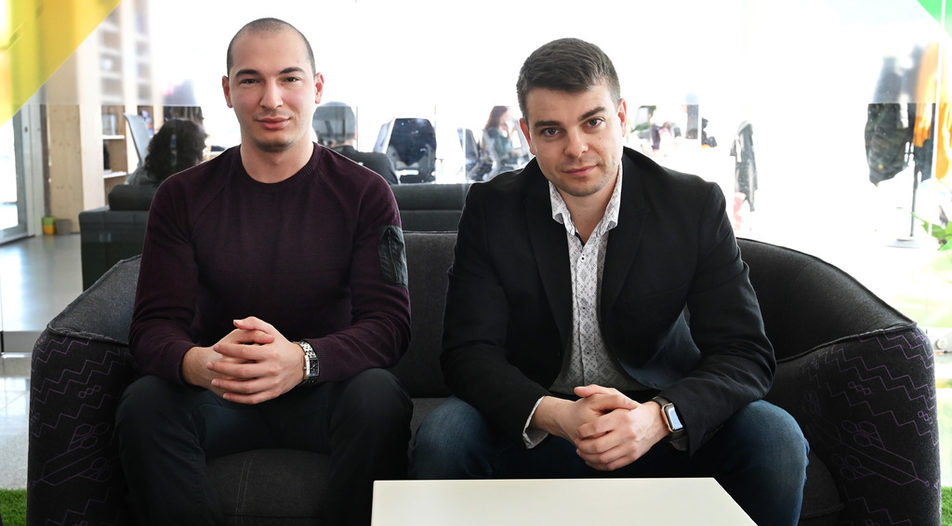A little over two years after it was founded in Bulgaria, fintech startup Payhawk went through Series A round of funding, attracting 32 million levs (16.4 million euro) from investors - the largest investment at this stage in the history of the Bulgarian entrepreneurial ecosystem. The round was led by the US-based QED Investors fund in which Nigel Morris - co-founder of Capital One, one of the largest credit card issuers in the US, is managing partner.
A co-investor is Berlin-based Earlybird Venture Capital fund which a year ago invested 2 million euro into the Bulgarian startup's corporate card business. Then, Earlybird led a 3 million euro round of funding which others in the field like Bulgarian firm Eleven, Germany-based TinyVC, and several other business angels such as Vasil Terziev and Svetozar Georgiev of Telerik, also participated in.
The Bulgarian enterprise Payhawk is owned by British firm Payhawk Limited which manages the business and revenue stream. Officially, the Bulgarian firm's valuation has not been confirmed but sources of Capital Weekly familiar with the market say that the new round places estimates at around $80 million.
New investment horizons
Payhawk is developing a platform and corporate cards in partnership with Visa, which makes it easier for SMEs to manage their budgets. Employees can make payments using their business cards, and afterward, they can scan the receipts or other documents through the mobile app, reporting corporate expenditures and generating accounting reports for the company in seconds. Thus, employees don't have to collect receipts, the company doesn't have to pay them back their expenses over time. The firm can also set limits on daily expenses or prohibit the use of corporate cards on weekends.

Payhawk's business has attracted the interest of investors since its founding at the end of 2018 by Hristo Borisov and Boyko Karadzhov. "We had an acquisition offer but we decided that we wanted to develop the vision and the company to a successful end," co-founder and CEO Hristo Borisov told Capital. The team's goal is to create one of the largest companies in the region, one that will permanently contribute to the development of the entrepreneurial ecosystem in Bulgaria.
Following the most recent investment round, QED Investors Chairman Yusuf Ozdalga will become a member of Payhawk's board alongside the two co-founders and existing investors Mehmed Atici from Earlybird Digital East and Vassil Terziev from Eleven Ventures.
"The company is growing at a phenomenal rate. The company's product fundamentals are exceptionally strong, and industry trends are working in the company's favor too. As budgets are more typically managed online by remote teams, there is unprecedented demand for cost-effective finance solutions," said Yusuf Ozdalga for the media.
What share of the business QED Investors acquired remains unknown. "Currently, the founders and employees own 45% of the company," Borissov said.
The investment will allow the fintech firm to develop its business to markets outside the UK and the EU. Payhawk has already established locations in Sofia, Berlin, London, and Barcelona. A large chunk of the money will go towards enlarging the team in Sofia. "That's where we're fully developing the product and the corporate strategy. We're developing our department for Talent Acquisition, and our focus is on Bulgarians who've studied abroad and have experience in similar fast-growing firms. We want to bring them back to Bulgaria," said Hristo Borissov. Currently, the firm's team is made up of 32 people, of whom 25 are based in Sofia. By the end of the year, Payhawk is planning to triple that number.
The crisis as an opportunity
According to Borissov, the pandemic is having a positive impact on Payhawk's business due to the digitalization of processes at many companies and the demand for simplified accounting models. The company provides firms with the opportunity to issue corporate Visa cards in over 30 markets, as well as direct bank payments in euro and British pounds. Their clients include a number of international companies like LuxAir, Lotto24, Viking Life, ATU, Gtmhub, Flink, MacPaw, and By Miles.
Payhawk's business model is based on monthly subscription fees that start at 90 euro and vary depending on the chosen plan, the functionality of the platform, and the size of the company. An additional charge of 8 euro is paid for each monthly card user. In 2019, Payhawk's turnover was just 45,000 levs, according to its financial statement, but the startup managed to increase monthly revenues tenfold in 2020. "Our goal is to keep up the rapid growth rate and achieve a five-fold increase in monthly turnover in 2021," said Hristo Borisov.
A little over two years after it was founded in Bulgaria, fintech startup Payhawk went through Series A round of funding, attracting 32 million levs (16.4 million euro) from investors - the largest investment at this stage in the history of the Bulgarian entrepreneurial ecosystem. The round was led by the US-based QED Investors fund in which Nigel Morris - co-founder of Capital One, one of the largest credit card issuers in the US, is managing partner.
A co-investor is Berlin-based Earlybird Venture Capital fund which a year ago invested 2 million euro into the Bulgarian startup's corporate card business. Then, Earlybird led a 3 million euro round of funding which others in the field like Bulgarian firm Eleven, Germany-based TinyVC, and several other business angels such as Vasil Terziev and Svetozar Georgiev of Telerik, also participated in.












